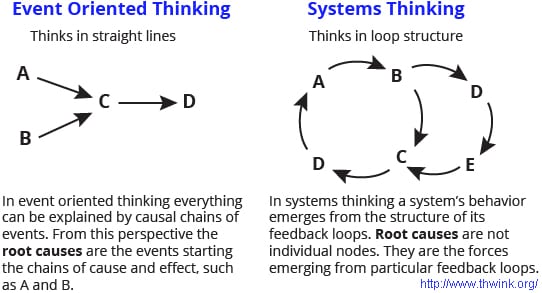Download Episode Here – right click link and select “Save Link As…”
In this episode, Joel and Antonia talk about systems thinking. They reject the notion of cause and effect and instead posit the idea that everything is an emergent property of a system.
In this podcast on Systems Thinking and the Illusion of Cause-and-Effect you’ll find:
- There is no such thing as Cause and Effect but only “Emergent Properties of Systems”
- Systems Thinking is a way of thinking or interacting with reality that is different from basic Cause and Effect.
- When we try to create influenced results, we end up having limited influence over it because we are not seeing the other Influencers or Nodes in the system.
- To have a desired result, recognize that nodes have to work in a certain way to have an “emergent” (thing that emerges from all things working together).
- We turn to Cause and Effect thinking because things are too complex to understand and because it is easier to fuse Sequential events.
- A System is a cluster of themes working together influencing each other; doing things synchronously and asynchronously and brings about an inevitable emergent.
- Two things to keep in mind about systems:
- Initial Condition (starting condition of a system)
- How the nodes in the system interact with each other
- Systems thinking is more accurate than Cause and Effect thinking. It improves relationships and gives more favorable results.
- Raymond Kurzweil’s Theory of Singularity states that Technology doubles in an exponential growth curve. Singularity is the time period where technology is doubling too fast to observe.
- The value of node connections is going up while the cost of information is lowering down.
- Intuition is needed now more than ever to figure which systems to work on, how systems are working and how to manage information.
- Gregory Bateson (Author, Steps to an Ecology of Mind) states “Systems are delicate. We don’t see them so we break them”.
Things we reference in this podcast:
To subscribe to the podcast, please use the links below:
Subscribe with iTunes
Non iTunes Link
Download The Android App
Subscribe on Soundcloud
Subscribe with Stitcher
If you like the podcast and want to help us out in return, please leave an honest rating and review on iTunes by clicking here. It will help the show and its ranking in iTunes immensely! We would be eternally grateful!
Want to learn more?
Discover Your Personal Genius
We want to hear from you. Leave your comments below…


Share:
Podcast - Episode 0038 - Personality Types in Personal Development
Podcast - Episode 0040 - Growth and Transitions
19 comments
This scene from “The Curious Case of Benjamin Button” was on my mind for the duration of the podcast. I think it’s a really accessible demonstration of the concept!
https://www.youtube.com/watch?v=6Zp7dq6b2PI
Thanks Antonia!
I answered this question in a Facebook conversation. I’ll copy/paste it here:
Q: Is “systems thinking” essentially “determinism” by another name?
A: No. Because we influence the systems and therefore the emergents are not exclusively based on outside factors.
If a car starts it’s because someone put the key into the ignition and turned it. But it’s also because all of the components in the car are running and compatible with each other. If they aren’t and a person turns the key nothing will happen. So the emergent (the car turns on or does nothing) is based upon the nodes in the system working in a certain order, but the catalyst was human will in this case.
In an individual there are many components that we have no control over that influence our identity. But there are also components over which we have a lot of control. I think of it as an airplane with a GPS system that is preprogrammed. While at the time we make the decision we may have already set up a system in motion which makes that decision inevitable, there was a time when we were ‘programming’ ourselves (or deciding either consciously or unconsciously to hand that power over) when we had the power to influence the decisions we’d be making in the future.
The answer isn’t so easy as determinism or nondeterminism. As always, it’s somewhere in between. And systems thinking is a tool that helps diagnose when we can have influence and when it’s out of our power.
As I understood determinism it ultimately indicated that things happen outside of human will and that people really have no way of controlling outcomes in their lives. It makes it impossible to hold people accountable since they have little to no influence over their identities, behaviors and outcomes.
I really don’t think this is a way of codifying that.
Hope that helps. :)
A
Hey I loved this episode. I recently started listening to your podcast from the beginning and I wish I would have discovered them earlier. This was intriguing. I didn’t realize that there is a clear definition and label for the recognition of the complexities that influence every single event. The concept isn’t new to me, but the label is. I was piqued by one word that Antonia used a couple times: inevitable. For example, in the illustration that Joel gave at the end about /the criminal painted as merely “pure evil”, Antonia used inevitable to describe the outcome as the system built it. Does this entirely discount personal choice? Or on the other hand, does it necessarily culminate in determinism? Thanks for providing some mind fuel for the rest of my day – you guys are great!
One of my all-time favorite systems thinkers is Russell Ackoff. Here’s a speech he gave before he died, though I recommend checking out everything available online about him: https://www.youtube.com/watch?v=EbLh7rZ3rhU